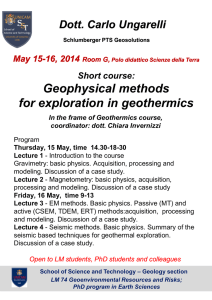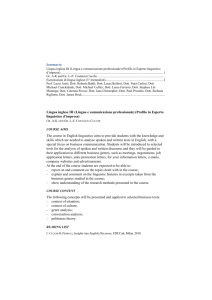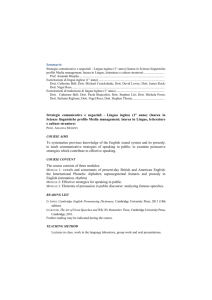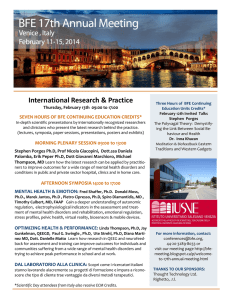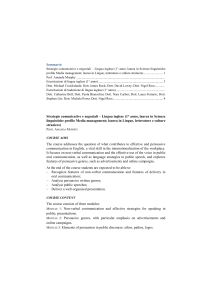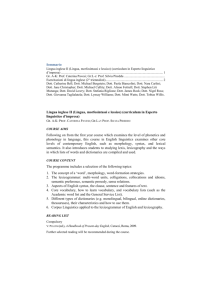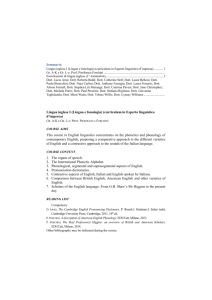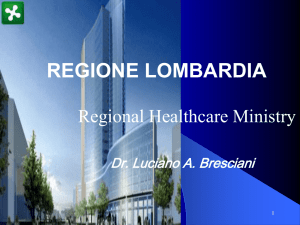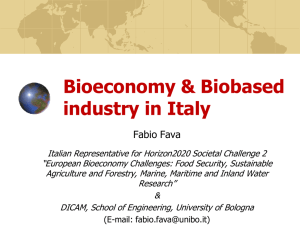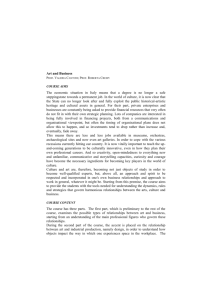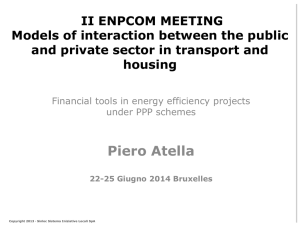Communicative and Negotiatory Strategies of the English Language
advertisement
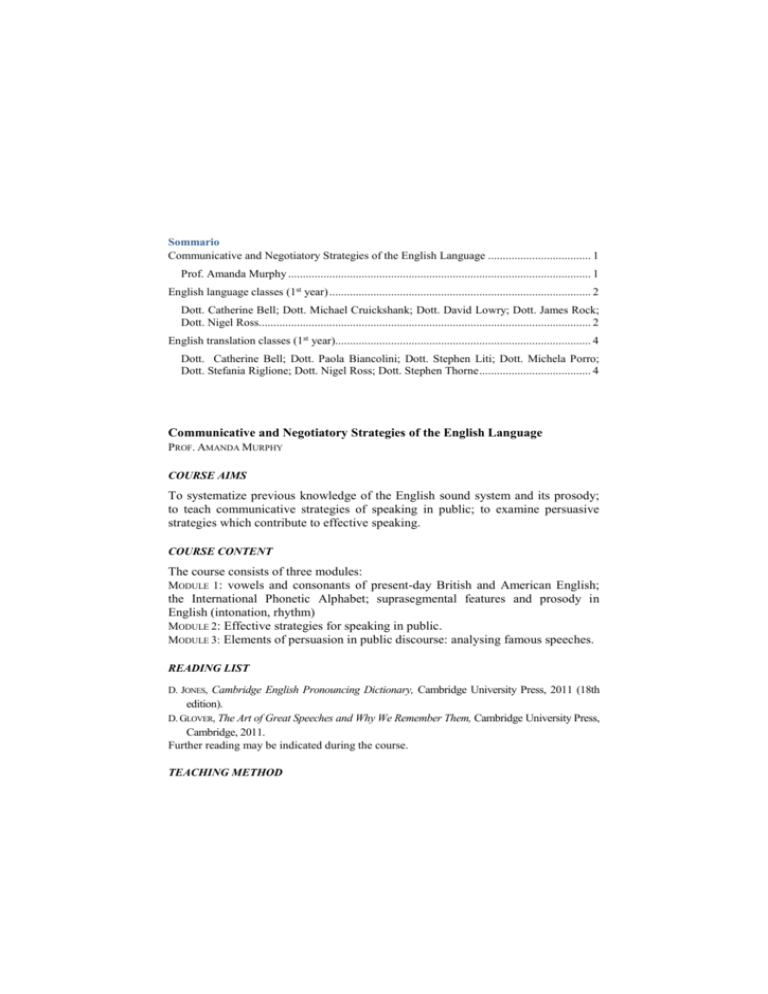
Sommario Communicative and Negotiatory Strategies of the English Language ................................... 1 Prof. Amanda Murphy ....................................................................................................... 1 English language classes (1st year) ......................................................................................... 2 Dott. Catherine Bell; Dott. Michael Cruickshank; Dott. David Lowry; Dott. James Rock; Dott. Nigel Ross................................................................................................................. 2 English translation classes (1st year)....................................................................................... 4 Dott. Catherine Bell; Dott. Paola Biancolini; Dott. Stephen Liti; Dott. Michela Porro; Dott. Stefania Riglione; Dott. Nigel Ross; Dott. Stephen Thorne ...................................... 4 Communicative and Negotiatory Strategies of the English Language PROF. AMANDA MURPHY COURSE AIMS To systematize previous knowledge of the English sound system and its prosody; to teach communicative strategies of speaking in public; to examine persuasive strategies which contribute to effective speaking. COURSE CONTENT The course consists of three modules: MODULE 1: vowels and consonants of present-day British and American English; the International Phonetic Alphabet; suprasegmental features and prosody in English (intonation, rhythm) MODULE 2: Effective strategies for speaking in public. MODULE 3: Elements of persuasion in public discourse: analysing famous speeches. READING LIST D. JONES, Cambridge English Pronouncing Dictionary, Cambridge University Press, 2011 (18th edition). D. GLOVER, The Art of Great Speeches and Why We Remember Them, Cambridge University Press, Cambridge, 2011. Further reading may be indicated during the course. TEACHING METHOD Lectures in class, work in the language laboratory, group work and oral presentations. ASSESSMENT METHOD Continuous assessment, written and oral, with a final oral exam. NOTES The course is taught in English. Students must enrol in the course on Blackboard. Further information can be found on the lecturer's webpage at http://docenti.unicatt.it/web/searchByName.do?language=ENG, or on the Faculty notice board. English language classes (1st year) DOTT. CATHERINE BELL; DOTT. MICHAEL CRUICKSHANK; DOTT. DAVID LOWRY; DOTT. JAMES ROCK; DOTT. NIGEL ROSS COURSE AIMS The aim of the course is to help students reach an advanced level in writing, reading, speaking and listening specific to their branch of study - English for Business and Management, Communication Studies, International Relations, Linguistics and Literary Studies, Tourism. Speaking and Listening Students are shown how to give clear, detailed descriptions and presentations on complex subjects. Attention is given to developing circumlocution strategies and encouraging students to qualify their opinions and statements. Practice is given in showing students how to adjust what they say and the means of expressing it to the recipient, and how to adopt a level of formality appropriate to the circumstances. Listening skills are improved as students are actively engaged in detailed discussion on general and complex topics both related to and beyond their field of study. At the end of the course, students are required to present a topic, using visual aids, and take an active part in simulated work situations, asking and answering questions, disagreeing and agreeing with other points of view, and summarising documents orally. Reading and Writing Specific attention is given to analysing a variety of both field-specific written genres, and to understanding some of the content-related conventions and techniques of written texts. Students are shown how to improve their ability to produce clearly intelligible continuous writing which follows standard layout and paragraphing conventions. Attention is also focused on encouraging students to express themselves in their writing with clarity and precision, using language flexibly, effectively and appropriately. At the end of the course, students are required to write on a domain-related topic, making reference to two theme-related texts. COURSE CONTENT Oral Production Students are presented during the course with practical spoken exercises aimed at satisfying the course objectives. Attention is given to enhancing students’ command of spoken English in professional contexts. This will involve enabling them to plan and give professional presentations, lead and take part in work-based negotiations and meetings; improve telephone skills, engage in transactions, undertake problem-solving tasks, as well as to discuss current events at an advanced level. Written Production A variety of written material is presented and students are shown how to identify specific textual genres. Practice is given in producing different forms of writing and improving the ability to plan and write texts in professional contexts. READING LIST Reference Grammar R. CARTER-M. MCCARTHY, Cambridge Grammar of English, A comprehensive guide, CUP, Cambridge, 2006. Other bibliographical references will be made available during the course. TEACHING METHOD Lessons in class. ASSESSMENT METHOD Written exam For the written exam, students have three hours to write a text of between 600/800 words, based on two other theme-related texts. Monolingual and bilingual dictionaries may be used during the exam. Oral exam Students are given a selection of topics to prepare for twenty minutes on the day of the exam. They are normally asked to discuss two of the prepared topics. Students are evaluated on receptive, productive and interactive skills, and must prove their competence in pronunciation, fluency, grammatical accuracy and lexical appropriacy. NOTES Students who choose English as a third language (with a one-year or two-year course in the BA or MA degrees) may attend the following lessons: In the first year (for those who take English for one or two years), lessons are held by Dott.ssa. Anna Caldirola. They are the same lessons as those she holds for students of Primary Teacher Education. There are 4 hours of lessons a week and the exam is organised by Dott.ssa. Caldirola. If English has been chosen for two years, in their second year students should attend four hours of lessons held by Dott.ssa Alison Fottrell from the first year of the BA in Language and Literary Sciences, Course J1. The exam is organised by Dott.ssa Fottrell. In the MA degree, students who continue English for a third year (having studied English for two years in their BA) may attend four hours of lessons held by Dott. Stephen Liti (Course A) for the second year of the BA in Language Sciences and Foreign Literature the exam is organised by Dott. Liti. Further information can be found on the lecturer's webpage at http://docenti.unicatt.it/web/searchByName.do?language=ENG, or on the Faculty notice board. English translation classes (1st year) DOTT. CATHERINE BELL; DOTT. PAOLA BIANCOLINI; DOTT. STEPHEN LITI; DOTT. MICHELA PORRO; DOTT. STEFANIA RIGLIONE; DOTT. NIGEL ROSS; DOTT. STEPHEN THORNE COURSE AIMS The aim of the course is to develop translation competence by means of analysing and translating various types of texts in English and Italian. Particular attention is paid to identifying the characteristic linguistic and cultural aspects of various text types in English and Italian, so as to develop skills which are useful both for personal cultural development and for professional activities. Texts and translation tasks reflecting realistic simulations of work will thus be proposed. READING LIST B. OSIMO, Manuale del Traduttore, Hoepli, Milano, 2002. M. BAKER, In Other Words. A Coursebook on Translation, Routledge, London, 1992. Other bibliographic indications will be given out during the course. TEACHING METHOD Lessons in class. ASSESSMENT METHOD The final test of specialised translation is made up of one translation from English to Italian and one from Italian to English. The texts to be translated differ according to the students' specialisation areas and are of about 200 words each. Students have 3 hours to translated both texts and both monolingual (English and Italian) and bilingual dictionaries are allowed. NOTES Further information can be found on the lecturer's webpage at http://docenti.unicatt.it/web/searchByName.do?language=ENG, or on the Faculty notice board.
